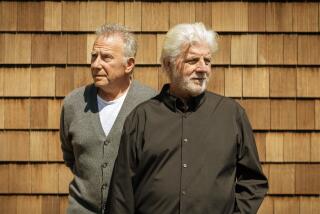Wesley L. McDonald dies at 84; 4-star Navy admiral led 1983 U.S. invasion of Grenada
- Share via
Reporting from Washington — Wesley L. McDonald, a four-star Navy admiral who commanded the 1983 invasion of Grenada for the U.S. military and who as a pilot led the first airstrike against North Vietnam in 1964 after the Gulf of Tonkin incident, died Feb. 8 at his home in Arlington, Va. He was 84.
FOR THE RECORD:
Wesley L. McDonald obituary: The obituary of Adm. Wesley L. McDonald in Monday’s California section said he served aboard several aircraft carriers as a first lieutenant. The Navy has no such rank. McDonald’s rank then was lieutenant. —
He had normal pressure hydrocephalus, a neurological disorder.
McDonald was commander in chief of all NATO and U.S. forces in the Atlantic when he was placed in charge of Operation Urgent Fury, the planned invasion of the Caribbean island nation of Grenada.
Ostensibly, the mission was to evacuate hundreds of U.S. medical students studying there after an internal coup of the socialist government. The Reagan administration feared a Soviet-sponsored Cuban military buildup, and some of the region’s other countries asked for U.S. intervention.
About 6,000 U.S. soldiers and Marines overwhelmed the 1,200 Grenadians and 780 Cubans in the waning days of October 1983. McDonald told the Senate Armed Services Committee several months later that despite inaccurate maps, problems with radio communications between different forces and the barring of press coverage during the invasion, Operation Urgent Fury was “a complete success.”
In 1985, the Pentagon’s inspector general was sharply critical of McDonald for failing to direct a full investigation of his subordinate, Vice Adm. Joseph Metcalf II, the task force commander of the invasion.
Metcalf took 24 captured Soviet-made rifles from Grenada, despite federal and military rules prohibiting such spoils. Lower-ranking soldiers had been disciplined for similar transgressions, but McDonald used bad judgment in allowing Metcalf to determine there was no need for an inquiry, the inspector general’s report said.
Wesley Lee McDonald was born July 6, 1924, in Washington, D.C. He graduated from Washington-Lee High School in Arlington and joined the U.S. Naval Academy at Annapolis as a member of the class of 1947.
That class, which matriculated a year early, included President Jimmy Carter, CIA Director Stansfield Turner, Vice Adm. James B. Stockdale, who was a Medal of Honor recipient, and Joint Chiefs of Staff Chairman William J. Crowe.
As an ensign, McDonald served in a South Pole expedition headed by Adm. Richard E. Byrd. As a first lieutenant and naval aviator, he served aboard several aircraft carriers, including the Coral Sea, which he returned to command in 1970-71.
In 1964, McDonald was commander of an attack squadron flying A-4 Skyhawks from the carrier Ticonderoga when the destroyer Turner Joy reported it was under attack by North Vietnamese torpedo boats. President Lyndon B. Johnson ordered retaliatory airstrikes, dubbed Operation Pierce Arrow, for which McDonald was the flight leader.
Whether the ships were under attack in the Tonkin Gulf has become a matter of serious historical dispute. McDonald later said he didn’t see anything in the water that night except American ships.
He rose through the Navy’s ranks, graduated from the National Defense University in 1969 and, after commanding the Coral Sea, became a rear admiral and carrier group commander during the final stages of the Vietnam War.
His other posts included deputy chief of naval personnel, deputy chief of naval operations for air warfare and commander of the 2nd Fleet.
In 1982, when he was promoted to admiral, he became Supreme Allied Commander Atlantic, one of two senior commanders in the North Atlantic Treaty Organization. At the same time, he assumed command of the U.S. Atlantic Command and the Atlantic Fleet.
After McDonald retired from the Navy in 1985, he volunteered for the National Aeronautic Assn., which later named its Elder Statesman of Aviation Award in his honor. Three naval aviation organizations jointly created a leadership award in his name, as well.
His first wife and high school sweetheart, Norma Joy McDonald, died in 1989.
Survivors include his wife of 16 years, Helen McDonald of Arlington; four children from his first marriage, retired Marine Corps Lt. Col. Thomas O. McDonald of San Antonio, Kathryn L. Overman of Lake Forest, Joy A. McDonald of Annandale, Va., and Toni M. McDonald of Santa Barbara; a brother; a half brother; a half sister; eight grandchildren; and six great-grandchildren.
Sullivan is a writer for the Washington Post, where this article first appeared.
More to Read
Start your day right
Sign up for Essential California for the L.A. Times biggest news, features and recommendations in your inbox six days a week.
You may occasionally receive promotional content from the Los Angeles Times.






